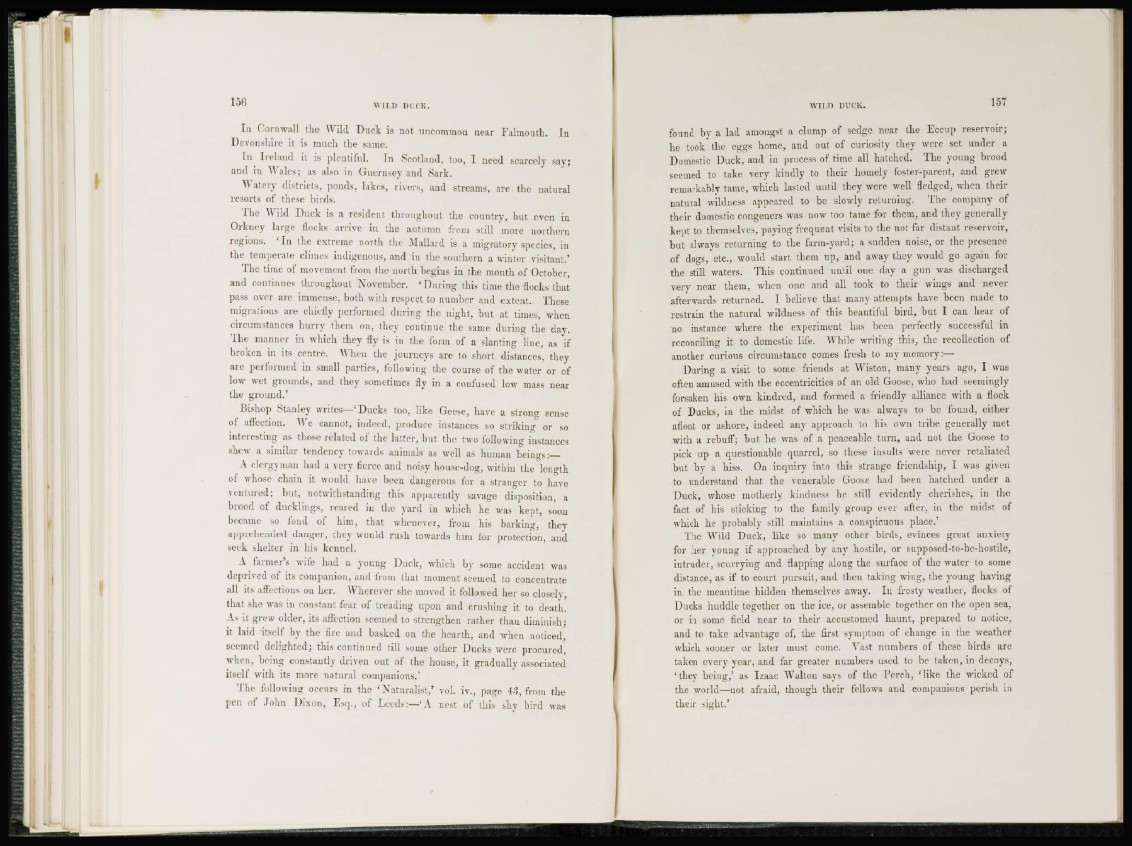
Iix Cornwall the Wild Duck is not uncommon near Falmouth. In
Devonshire it is much the same.
I n Ireland it is plentiful. In Scotland, too, I need scarcely say;
and in Wales; as also in Guernsey and Sark.
Watery districts, ponds, lakes, rivers, and streams, are the natural
resorts of these birds.
The Wild Duck is a resident throughout the country, but even in
Orkney large flocks arrive in the autumn from still more northern
regions. 'In the extreme north the Mallard is a migratory species, in
the temperate climes indigenous, and in the southern a winter visitant.'
The time of movement from the north begins in the month of October,
and continues throughout November. ' During this time the flocks that
pass over are immense, both with respect to number and extent. These
migrations are chiefly performed dining the night, but. at. times, when
circumstances hurry thrni on, they continue the same during the day.
I lu manner in which they flv is in the form of a slanting line, as if
broken in its centre. When the journeys are to short distances, they
arc performed in small parties, following the course of the water or of
low wet grounds, and they sometimes fly in a confused low mass near
the ground.'
Bishop Stanley writes—'Ducks too, like Geese, have a strong sense
of affection. We cannot, indeed, produce instances so striking or so
interesting as those related of the latter, but the two following instances
shew a similar tendency towards animals as well as human beings:—
A clergyman had a very fierce and noisy house-dog, within the length
of whose chain it would have been dangerous for a stranger to have
ventured; but, notwithstanding this apparently savage disposition, a
brood of ducklings, reared in the yard in which he was kept, soon
became so fond of him, that whenever, from his barking, they
apprehended danger, they would rush towards him for protection, aud
seek shelter in his kennel.
A farmer's wife had a young Duck, which by some accident was
deprived of its companion, and from that moment seemed to concentrate
all its affections on her. Wherever she moved it followed her so closely,
that she was in constant fear of treading upon and crushing it to death.
As it grew older, its affection seemed to strengthen rather than diminish;
it laid itself by the fire and basked on the hearth, and when noticed,
seemed delighted; tins continued till some other Ducks were procured,
when, being constantly driven out of the house, it gradually associated
itself with its more natural companions.'
The following occurs in the 'Naturalist,' vol. iv., page 4-3, from the
pen of John Dixon, Esq., of Leeds:—'A nest of this shy bird was
found by a lad amongst a clump of sedge near the Eccup reservoir;
he took the eggs home, and out of curiosity they were set under a
Domestic. Duck, and in process of time all hatched. The young brood
seemed to take very kindly to their homely foster-parent, and grew
remarkably tame, which lasted until they were well fledged, when their
natural wildness appeared to be slowly returning. The company of
their domestic congeners was now too tame for them, and they generally
kept to themselves, paying frequent visits to the not far distant reservoir,
but always returning to the farm-yard; a sudden noise, or the presence
of dogs, etc., would start them up, and away they would go again for
the still waters. This continued until one day a gun was discharged
very near them, when one aud all took to their wings and never
afterwards returned. I believe that many attempts have been made to
restrain the natural wildness of this beautiful bird, but I can hear of
no instance where the experiment has been perfectly successful in
reconciling it to domestic life. While writing this, the recollection of
another curious circumstance comes fresh to my memory:—
During a visit to some friends at Wiston, many years ago, I was
often amused with the eccentricities of an old Goose, who had seemingly
forsaken his own kindred, and formed a friendly alliance with a flock
of Ducks, in the midst of wdiich he was always to be found, either
afloat or ashore, indeed any approach to his own tribe generally met
with a rebuff; but he was of a peaceable turn, and not the Goose to
pick up a questionable quarrel, so these insults were never retaliated
but by a hiss. On inquiry into this strange friendship, I was given
to understand that the venerable Goose had been hatched under a
Duck, whose motherly kindness he still evidently cherishes, in the
fact of his sticking to the family group ever after, in the midst of
which he probably still maintains a conspicuous place.'
The Wild Duck, like so many other birds, evinces great anxiety
for her young if approached by any hostile, or supposed-to-be-hostile,
intruder, scurrying and flapping along the surface of the water to some
distance, as if to court pursuit, and then taking wing, the young having
in the meantime hidden themselves away. In frosty weather, flocks of
Ducks huddle together on the ice, or assemble together on the open sea,
or in some field near to their accustomed haunt, prepared to notice,
and to take advantage of, the first symptom of change in the weather
which sooner or later must come. Vast numbers of these birds are
taken every year, and far greater numbers used to be taken, in decoys,
' t h e y being,' as Izaac Walton says of the Perch, ' l i k e the wicked of
the world—not afraid, though their fellows and companions perish in
their sight.'